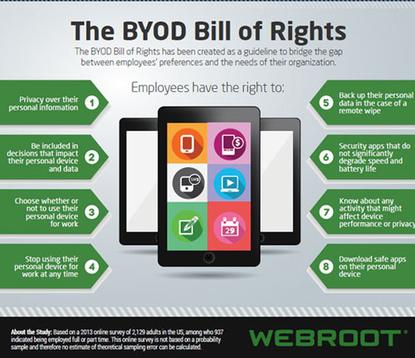BYOD Widening Employee-Employer Trust Gap, Survey Finds
- 22 May, 2014 09:48

The Bring-Your-Own-Device Bill of Rights
This question was posed to more than 2,000 employees in the United States, as part of a Webroot-commissioned Harris Interactive survey. The key finding: Nearly half of respondents said they would stop using their BYODs if corporate policy required the installation of a security app.
Truth is, the trust gap between employee and employer has widened over time. BYOD user policies heavily favoring companies' rights to monitor, access, review and disclose corporate or other data on BYOD phones and tablets, while giving short shrift to the employee's expectation of privacy, have only exacerbated the problem.
[Related: How BYOD Puts Everyone at Legal Risk]
Companies know most employees scroll past the small print legalese of BYOD user policies and mindlessly click the "accept terms" buttons, essentially handing over rights. In an AdaptiveMobile survey on BYOD practices, more than 60 percent of companies said they have kill-switch and lock-device capabilities that most employees aren't aware of.
In the Webroot survey, employees worried the most about companies being able to access personal data on BYODs, with a majority of respondents describing themselves as either extremely concerned or very concerned about the possibility. Nearly three out of four employees felt they should have some influence on the software installed or security enforced on BYODs.
Is it time for an employee BYOD bill of rights? Webroot came up with the following eight-point guide to help bridge the employee-employer trust gap while also keeping corporate data safe in a BYOD world.
Tom Kaneshige covers Apple, BYOD and Consumerization of IT for CIO.com. Follow Tom on Twitter @kaneshige. Follow everything from CIO.com on Twitter @CIOonline, Facebook, Google + and LinkedIn. Email Tom at tkaneshige@cio.com
Read more about technology topics in CIO's Technology Topics Drilldown.

